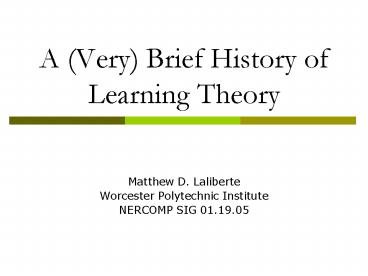A Very Brief History of Learning Theory - PowerPoint PPT Presentation
1 / 25
Title:
A Very Brief History of Learning Theory
Description:
A (Very) Brief History of Learning Theory. Matthew D. Laliberte. Worcester Polytechnic Institute ... Critiques of Social Learning Theory ... – PowerPoint PPT presentation
Number of Views:215
Avg rating:3.0/5.0
Title: A Very Brief History of Learning Theory
1
A (Very) Brief History of Learning Theory
- Matthew D. Laliberte
- Worcester Polytechnic Institute
- NERCOMP SIG 01.19.05
2
Learning as a Black Box
So whats happening inside the box?
3
A Superficial Review
- Behaviorism
- Cognitivism
- Social Learning Theory
- Social Constructivism
- Multiple Intelligences
- Brain-Based Learning
4
Behaviorism
- Learning is defined by the outward expression of
new behaviors - Focuses solely on observable behaviors
- A biological basis for learning
- Learning is context-independent
- Classical Operant Conditioning
- Reflexes (Pavlovs Dogs)
- Feedback/Reinforcement (Skinners Pigeon Box)
5
Behaviorism in the Classroom
- Rewards and punishments
- Responsibility for student learning rests
squarely with the teacher - Lecture-based, highly structured
6
Critiques of Behaviorism
- Does not account for processes taking place in
the mind that cannot be observed - Advocates for passive student learning in a
teacher-centric environment - One size fits all
- Knowledge itself is given and absolute
- Programmed instruction teacher-proofing
7
Cognitivism
- Grew in response to Behaviorism
- Knowledge is stored cognitively as symbols
- Learning is the process of connecting symbols in
a meaningful memorable way - Studies focused on the mental processes that
facilitate symbol connection
8
Cognitivism cont.
- Jean Piaget
- Genetic Epistemology
- Assimilation and Accommodation
- Jerome Bruner
- Discovery Learning
- Learner as independent problem-solver
9
Cognitivism in the Classroom
- Inquiry-oriented projects
- Opportunities for the testing of hypotheses
- Curiosity encouraged
- Staged scaffolding
10
Critiques of Cognitivism
- Like Behaviorism, knowledge itself is given and
absolute - Input Process Output model is mechanistic and
deterministic - Does not account enough for individuality
- Little emphasis on affective characteristics
11
Social Learning Theory (SLT)
- Grew out of Cognitivism
- A. Bandura (1973)
- Learning takes place through observation and
sensorial experiences - Imitation is the sincerest form of flattery
- SLT is the basis of the movement against violence
in media video games - Bobo Doll Experiment
12
SLT in the Classroom
- Collaborative learning and group work
- Modeling responses and expectations
- Opportunities to observe experts in action
13
Critiques of Social Learning Theory
- Does not take into account individuality,
context, and experience as mediating factors - Suggests students learn best as passive receivers
of sensory stimuli, as opposed to being active
learners - Emotions and motivation not considered important
or connected to learning
14
Social Constructivism
- Grew out of and in response to Cognitivism,
framed around metacognition - Knowledge is actively constructed
- Learning is
- A search for meaning by the learner
- Contextualized
- An inherently social activity
- Dialogic and recursive
- The responsibility of the learner
- Lev Vygotsky
- Social Learning
- Zone of Proximal Development
15
Social Constructivism in the Classroom
- Journaling
- Experiential activities
- Personal focus
- Collaborative cooperative learning
16
Critiques of Social Constructivism
- Suggests that knowledge is neither given nor
absolute - Often seen as less rigorous than traditional
approaches to instruction - Does not fit well with traditional age grouping
and rigid terms/semesters
17
Multiple Intelligences (MI)
- Grew out of Constructivism, framed around
metacognition - H. Gardner (1983 to present)
- All people are born with eight intelligences
- Enables students to leverage their strengths and
purposefully target and develop their weaknesses
18
MI in the Classroom
- Delivery of instruction via multiple mediums
- Student-centered classroom
- Authentic Assessment
- Self-directed learning
19
Critiques of MI
- Lack of quantifiable evidence that MI exist
- Lack of evidence that use of MI as a curricular
and methodological approach has any discernable
impact on learning - Development process is a time-sink
- Suggestive of a departure from core curricula and
standards
20
Brain-Based Learning (BBL)
- Grew out of Neuroscience Constructivism
- D. Souza, N. Caine G. Caine, E. Jensen (1980s
to present) - 12 governing principles
21
BBL in the Classroom
- Opportunities for group learning
- Regular environmental changes
- A multi-sensory environment
- Opportunities for self-expression and making
personal connections to content - Community-based learning
22
Critiques of BBL
- Research conducted by neuroscientists, not
teachers educational researchers - Lack of understanding of the brain itself makes
brain-based learning questionable - Individual principles have been scientifically
questioned
23
Other Learning Theories of Note
- Andragogy (M. Knowles)
- Flow (M. Czikszentmihalyi)
- Situated Learning (J. Lave)
- Subsumption Theory (D. Ausubel)
- Conditions of Learning (R. Gagne)
24
Learning as a Not-So-Black Box
25
(No Transcript)































